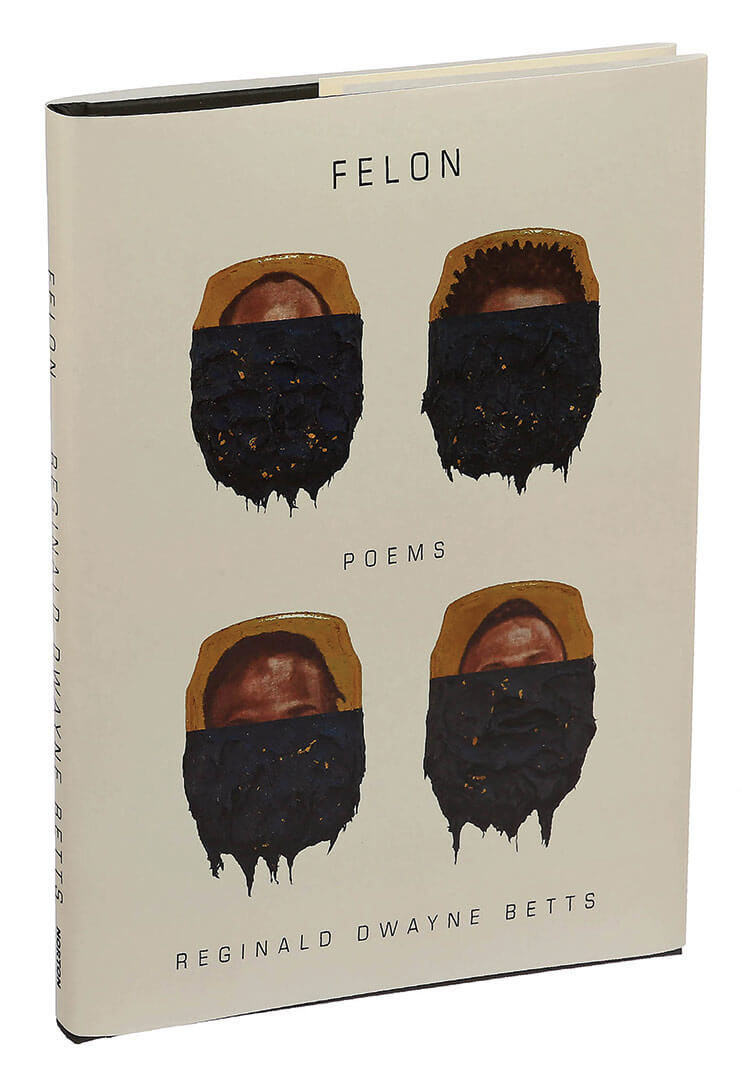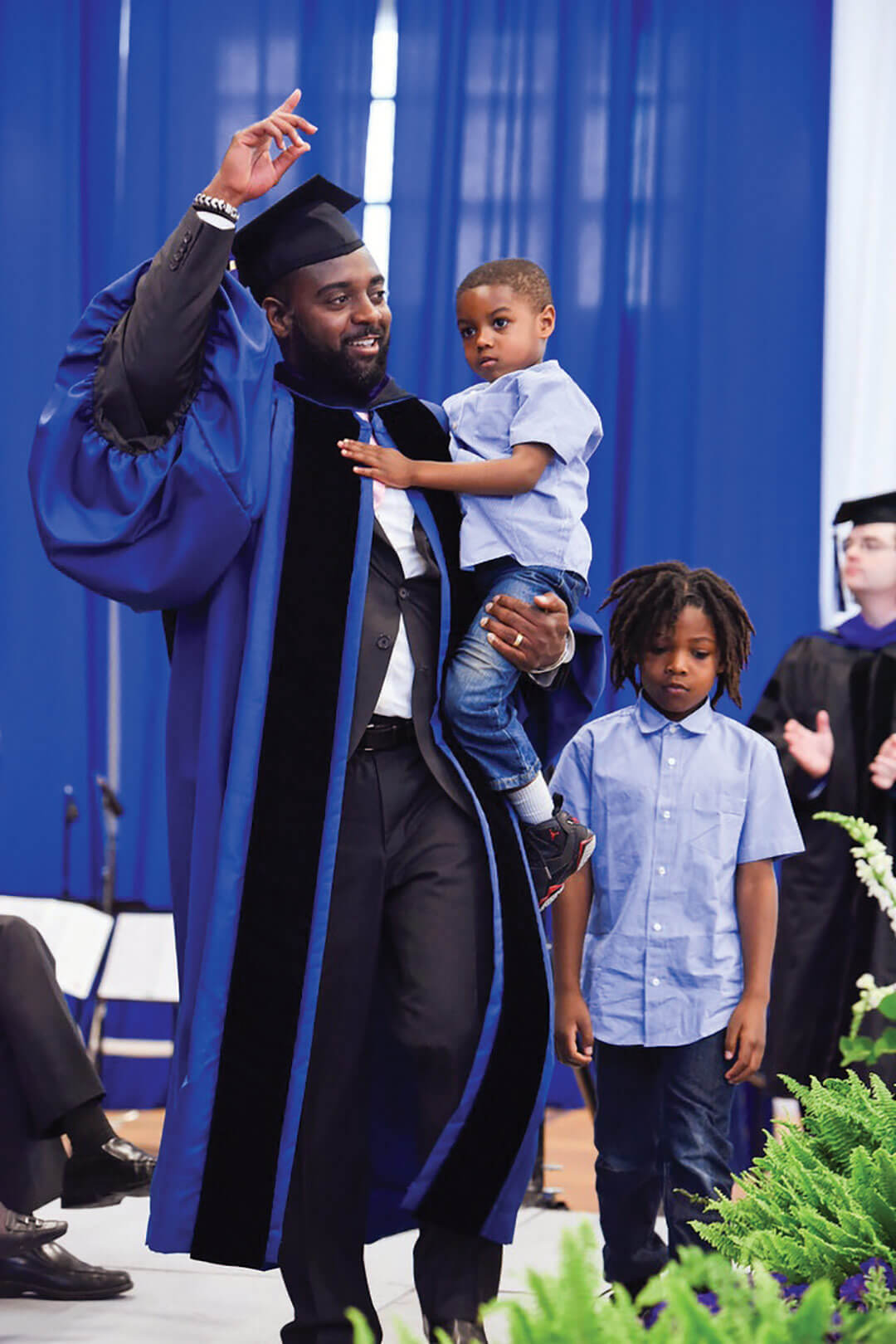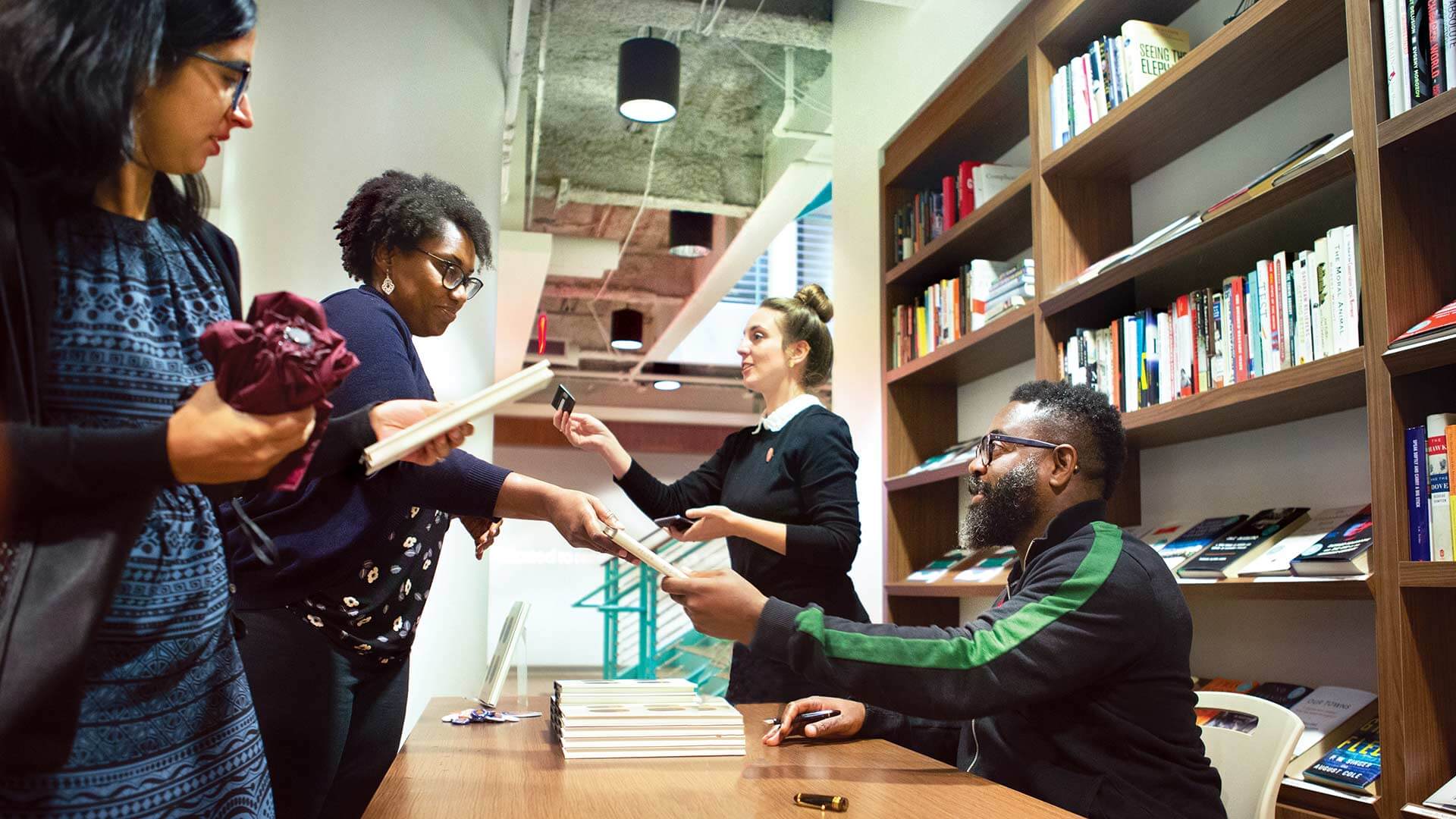- February 20, 2020
- By Sala Levin ’10
The Rubik’s cube in Reginald Dwayne Betts’ hands is so close to complete—the top layer is the only one giving him trouble. On a September morning in a coffee shop in New Haven, Conn., he twirls it round and round, spinning it this way and that, and yet one square on each side remains stubbornly the wrong color.
Over the last year, Betts ’09 has been mastering the cube, inspired by a colleague who brought in the toy one day and the discovery that he has a knack for sorting it out. YouTube videos have improved his skills. “All of a sudden it was demystified,” he says. Solving the puzzle is nothing more than a simple algorithm. “It’s just like life. If you figure out the right steps, then you can get to where you need to be.”
The metaphor is so neat that I have to wonder if Betts planned it. And if the colors don’t fall into place? “If you have faith in the steps you’ve taken, then it might be something wrong in the way you structure those steps. I know those steps were right, I know that the algorithm was right, but maybe I was in the wrong place.”
At 39, Betts—tall and striking, with a full beard and the kind of thick-rimmed glasses you’d imagine a poet wearing—knows right steps from wrong steps. An armed carjacking at age 16 cleaved his life into before and after: before, a childhood of run-of-the-mill classroom troublemaking, and after, a maze of courtrooms and jail cells.
And then, another turn: In prison, Betts, long a reader, began to write his story, first with a memoir and then two acclaimed books of poems, followed last fall by another poetry collection, “Felon.” Along the way, college called, repeatedly: an undergraduate degree at the University of Maryland, an MFA at Warren Wilson College, then a J.D. and now a Ph.D. in law at Yale.
This morning, Betts stops the conversation more than once to note that he likes the song playing in the coffee shop, even when he acknowledges it as “hokey.” Betts is comfortable with the lowbrow and high. That schmaltzy Ed Sheeran song? He likes it. A long digression on fatherhood in August Wilson’s play “King Hedley II”? He can hold forth on that, too. And when it comes to why he pursued law, he’s equally without pretense. “Law is this human invention that allows us not to kill each other,” he says. “I don’t think that just kindness will suffice.”
Betts’ childhood in Suitland, Md., just outside Washington, wasn’t much different from those of his classmates. A smart kid, he’d been in gifted and talented programs since second grade. He lived with his mom, smoked weed with his buddies, mouthed off to teachers. “He was very talkative, extroverted, always really excited about whatever it was he was talking about,” says Marcus Bullock, who met Betts playing basketball at Suitland High School. “He was pure passion.”
 Betts’ father didn’t have much of a role in his life—he’d done time in prison. The two share a name (though the younger Betts goes by Dwayne), but Betts rejects the idea that past is necessarily prologue. “We need a shorthand to talk about pathology, to assert pathology,” he says. “Not having a father in the house is a shorthand—sometimes we don’t have f—ing answers, so saying that becomes an easier answer.
Betts’ father didn’t have much of a role in his life—he’d done time in prison. The two share a name (though the younger Betts goes by Dwayne), but Betts rejects the idea that past is necessarily prologue. “We need a shorthand to talk about pathology, to assert pathology,” he says. “Not having a father in the house is a shorthand—sometimes we don’t have f—ing answers, so saying that becomes an easier answer.
On Dec. 6, 1996, Betts drove with Bullock and a few other boys, whom he knew only vaguely or not at all, to Springfield Mall in Fairfax, Va. High and hoping for some extra cash, the boys pulled into the parking lot. The driver put a pistol in Betts’ hand—the first time Betts had ever held a gun—and out he went into the night. He approached a green Pontiac Grand Prix, saw a man sleeping inside, tapped the window with the gun and demanded the man’s keys and wallet. Then he and his friend drove off in the car. Two days later, he and Bullock were arrested with the man’s credit card at a different mall.
Betts appeared before a judge only to learn he’d remain in custody until his next court date, in January, after Christmas. “I was still thinking about video games, which on one level is mind-boggling, but on another level probably is absolutely age-appropriate. The real tension is that robbery isn’t age-appropriate, and the real tension is the state, the system, the court trying to figure out what you do when somebody’s doing something that is just not okay.”
Ultimately, Betts was sentenced to nine years in prison—time that changed the calculation of what’s age-appropriate. “Being teenagers sentenced to maximum-security prison—it’ll force you to grow up fast,” says Bullock, who also served time for his role in the carjacking. “We had to adjust to the environment around us to keep us alive.”
Betts spent nearly a year and a half in solitary confinement. Each morning guards took his mattress so that he could not sleep during the day. Around him, men were sometimes strapped down by their arms and legs. Others talked to themselves. “How do I explain this?” Betts has written. “Each day, I lost a little bit of what made me want to be free.”
It was in solitary confinement that Betts found poetry, or it found him. One day, a copy of “The Black Poets,” an anthology edited by Dudley Randall, appeared under his door at Red Onion State Prison, a super-max prison in Southwest Virginia known as the state’s toughest. Soon, Betts was writing poetry, too: “ten thousand / years of sentences / beckon over heads & hearts, / silent, a promise, like mistletoe.”
After being released from prison in 2005 at age 24, Betts got an entry-level job at a Duron Paints shop in Washington, D.C., alongside Bullock. Soon, Betts was thinking about college. After meeting with an adviser at the University of Maryland, Betts started taking classes at Prince George’s Community College and left his job for another at the Bowie, Md., location of Karibu Books, a black-owned chain of stores. One day, he chatted up a customer named Terese Robinson, also a student at the college. They married three years later.
 After finishing at Prince George’s Community College, Betts enrolled at UMD. Separated from the other students by his history and age—and his home life with a wife and, soon, their first child, Micah—Betts bore down on academics. In Professor Emeritus Maynard “Sandy” Mack’s introductory class on Shakespeare, it was immediately “clear that this guy was operating on a different level from the rest of the students,” Mack says. “He raised his hand tentatively and asked a question so much richer and more thoughtful than where anybody is on the first day of class.”
After finishing at Prince George’s Community College, Betts enrolled at UMD. Separated from the other students by his history and age—and his home life with a wife and, soon, their first child, Micah—Betts bore down on academics. In Professor Emeritus Maynard “Sandy” Mack’s introductory class on Shakespeare, it was immediately “clear that this guy was operating on a different level from the rest of the students,” Mack says. “He raised his hand tentatively and asked a question so much richer and more thoughtful than where anybody is on the first day of class.”
In 2009, Betts addressed the university as the student speaker at commencement and published “A Question of Freedom: A Memoir of Learning, Survival, and Coming of Age in Prison.” “By then I knew all the facts, but facts on something like this are only a small part of the story,” says Mack. “It’s the pain and thoughtfulness that really get to you.”
Betts’ first book of poetry, 2010’s “Shahid Reads His Own Palm,” also mined the pain of his time behind bars, evoking what NPR called “a repeated quiet devastation.” He also began speaking publicly about his life’s path. In 2012, he was appointed by President Barack Obama to act as a spokesperson for the Coordinating Council on Juvenile Justice and Delinquency Prevention. “This work is about getting people I know out” of prison, he says. “I’m thinking about friends.”
A fellowship at Harvard’s Radcliffe Institute for Advanced Study led to Betts’ next book of poetry, 2015’s “Bastards of the Reagan Era,” and a year later, he decided to apply to law school. “I figured that at least for three years, my student loan bill wouldn’t be due each month,” he wrote in a 2018 National Magazine Award-winning essay in The New York Times Magazine. But he also offered a more complex motivation. “Maybe we all pursued law to save someone left behind,” he wrote. “Maybe we pursued it to save ourselves.”
Accepted by eight law schools, including Harvard, Columbia and Georgetown, Betts enrolled at Yale, where he made no secret of his past. His application’s personal statement opened with, “The part of my life that has been most influential in my drive to go to law school is also the greatest obstacle to my being admitted to law school and becoming an attorney.”
Michael Wishnie, William O. Douglas Clinical Professor of Law, was one of the two faculty readers for that application. “I almost never remember admissions files—I read 50 a year and a handful of people are admitted, but I never retain the names,” he says. Betts, however, stood out. “I really felt amazed that I got to be on the same campus as someone like him.”
In law school, Betts was, he says, a “real student,” more fully engaged in campus life than he was as an undergrad—he organized a speaker series, worked in law clinics and gave a book talk on his memoir. “I was more settled. I thought I had made it to some final destination, at least academically.”
When it came time to apply to the bar, Betts hit a snag. His application was deferred as the Connecticut Bar Examining Committee decided it needed more time to determine whether Betts met the “character and fitness” requirement.
The bar’s decision, Betts says, was “disappointing,” if not entirely surprising. Wishnie and New Haven attorney Willie Dow served pro bono as co-counsel on Betts’ case. They collected letters and statements attesting to Betts’ character from professors, other law students, judges, incarcerated and formerly incarcerated people—“just an enormous array of people from all walks of life who had the good fortune of meeting Dwayne somewhere along the way,” says Wishnie.
The letters worked—Betts was admitted to the bar several months later. “I think admitting Dwayne Betts raises the average moral character of the members of the bar in Connecticut,” Wishnie says.
 “Felon”: It’s a confrontational book title, and itself a question about how the world labels people. Felon, ex-convict, formerly incarcerated person—“I see myself as all those things, and see those things as failing to actually describe what’s most meaningful about a person,” Betts says.
“Felon”: It’s a confrontational book title, and itself a question about how the world labels people. Felon, ex-convict, formerly incarcerated person—“I see myself as all those things, and see those things as failing to actually describe what’s most meaningful about a person,” Betts says.
If his first book of poetry was “rooted in prison and in the experience of people who are incarcerated” and his second was about the war on drugs and its ramifications, this third one examines interpersonal relationships: Love poems, absent from his first two collections, are in these pages. The poems—which Betts received a 2018 Guggenheim Fellowship to write—navigate “the challenges that confront men in relationships with women where the time you spent in prison is the third person in that relationship,” he says.
Children, too, make appearances in the poems. “Betts’s poems about fatherhood, some of the most powerful I’ve read, describe a nearly unimaginable bind: how do you explain that you actually did something that a racist would assume you were likely to end up doing anyway?” wrote Dan Chiasson in a review of “Felon” in The New Yorker. Betts says his sons—Miles and Micah, now 7 and 11—don’t ask much about his time in prison, but “they also don’t ask me about my experiences in law school.”
School isn’t over for Betts—his Ph.D., which he estimates he’ll finish in about two years, is a way for him to learn what “I feel like I need to know to be a legal scholar,” he says. The classroom is a natural fit for Betts, says Bullock, who remembers him as “an academic” from high school. “It wouldn’t surprise me if Dwayne was like, ‘I’m going to get another Ph.D.,’” he says. “I’d say, ‘Yeah, that sounds about right.’”
Back at the coffee shop, Betts readies to leave to meet a photographer from The New Yorker for a portrait to accompany Chiasson’s book review. He triumphantly tosses the completed Rubik’s cube on the table. “It was just one stupid thing that I was doing,” he says. “I was facing the cube the wrong way on that last move, so I was just going in circles.” And now, here’s proof: He’s turned the cube around. He had faith that he knew the steps. The algorithm, it turns out, was right.
Topics
People